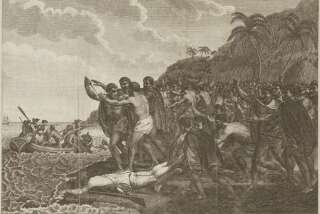Book review: ‘The Information’ by James Gleick
The Information
A History, a Theory, a Flood
James Gleick
Pantheon: 531 pp., $29.95
Partway through “The Information: A History, a Theory, a Flood,” James Gleick describes a technological innovation so transformative that it was heralded as “one of the grand way-marks in the onward and upward march of the human intellect” by the New York Times. “What was the essence of the achievement?” Gleick asks. “‘The transmission of thought, the vital impulse of matter.’ The excitement was global but the effects were local. … Information that just two years earlier had taken days to arrive at its destination could now be there — anywhere — in seconds. This was not a doubling or tripling of transmission speed; it was a leap of many orders of magnitude. It was like the bursting of a dam whose presence had not even been known.”
Sound familiar? It should. The telegraph, after all, changed everything when it was popularized in the 1840s; by 1858, a transatlantic cable had put Britain’s Queen Victoria and President James Buchanan in direct contact, while news, gossip and commercial orders blazed across the wires. “Some worried that the telegraph would be the death of newspapers,” Gleick writes, although “newspapers could not wait to put the technology to work.” All of a sudden, information was not just a tool but also a commodity. “Because the telegraph was an information technology,” he posits, “it served as an agent of its own ascendency.”
The story of the telegraph is central to “The Information,” which is a wide-ranging, deeply researched and delightfully engaging history — going back to Homer and Socrates (who distrusted written language as a corruption of pure memory) and extending, in loosely chronological fashion, to our contemporary culture of downloads and data clouds — of how we have come to occupy a world defined in bits and bytes. For Gleick, information has always been our medium; since cave dwellers painted the first animal forms on their walls, we have existed in two parallel universes, the biosphere and the infosphere.
“We are the species,” he observes, “that named itself Homo sapiens, the one who knows — and then, after reflection, amended that to Homo sapiens sapiens.” Our self-consciousness, in other words — our awareness of our awareness — resides at the heart of our incessant need to process and to know. Over the course of human culture, there have been a number of significant transformations, beginning with the alphabet, which Gleick calls “a founding technology of information. The telephone, the fax machine, the calculator, and, ultimately, the computer are only the latest innovations devised for saving, manipulating, and communicating knowledge.” It is his idea that all these technologies exist as part of a continuum, with each developing from the last.
The key to such an argument is perspective, which is often in short supply when it comes to the information culture, with its tendency to inspire either paeans or jeremiads. Gleick, however, is too smart for that; he’s all about the forest, not the trees. Throughout his career he’s addressed difficult concepts accessibly but with an abiding sense of their complexity; his 1987 breakthrough work “Chaos: Making a New Science” (a finalist for both the Pulitzer Prize and the National Book Award) helped popularize chaos theory, while his 1992 biography “Genius: The Life and Science of Richard Feynman” brought attention to the physicist and his work.
That’s true also of “The Information,” which invokes both chaos theory and Feynman, as well as a dizzying array of other subjects, including African talking drums, the Jorge Luis Borges story “The Library of Babel,” Charles Babbage’s Difference Engine (a failed attempt, in 19th century England, to create a mechanical computer 100 years before the electronic age) and the embrace of paradox in Austrian mathematician Kurt Gödel’s 1931 Incompleteness Theorem.
In places, the science can be overwhelming: Even Gleick admits it’s “hard to summarize” Claude Shannon’s 1948 paper “Mathematical Theory of Communication,” with its logarithms and formulas, its statistical probabilities. The density, however, is unavoidable if we want to understand Shannon’s thinking, or why Gleick frames him as an essential figure in “The Information,” a Bell Labs researcher and the first person to theorize the bit as a “unit for measuring information … as though there were such a thing, measurable and quantifiable, as information.”
For Gleick, as for all of us, this has become a fundamental concept, obvious now but utterly revolutionary in its time. The same might be said of the dictionary, which he describes as an early information system, or the double helix, which he portrays as the space where biology and information merge. To render the material more approachable, he refracts it through a series of character studies of people such as Shannon or Babbage, or the mathematician Norbert Wiener, with whom Shannon studied at MIT. It’s the type of narrative strategy he has used effectively in prior works, but in “The Information,” it serves another, more encompassing purpose, which is to create a sense of context at the center of the book.
This is a notion to which Gleick returns again and again, creating a network of associations that mirrors the networks (neural, informational) of which he writes. Without context, he suggests, we are awash in a different kind of chaos: “‘[t]he tsunami of available fact, context, and perspective’ — that [David Foster Wallace] wrote in 2007, constitutes Total Noise.” Without context, we are prey to entropy, to the propensity of everything to run down.
“We are swimming upstream against a great torrent of disorganization,” Gleick quotes Wiener, “which tends to reduce everything to the heat death of equilibrium and sameness. … In this, our main obligation is to establish arbitrary enclaves of order and system. … Like the Red Queen, we cannot stay where we are without running as fast as we can.” That’s as good an argument as you’re likely to find for the importance of information systems, for hierarchies and for networks, since without them there is no way of knowing who or where we are.
And yet, Gleick remains relatively sanguine on the ability of systems, or networks, to sort themselves. (He writes at length about Wikipedia as a self-policing community, despite the skepticism it provokes among journalists and academics.) Or to remain unsorted, since ultimately there is so much information that “[o]ne can fairly say that even God has forgotten.” Toward the end of the book, he recalls the great library of Alexandria, which, beginning in the third century BC, “maintained the greatest collection of knowledge on earth, then and for centuries to come.” Among its hundreds of thousands of scrolls, Gleick tells us, were “the dramas of Sophocles, Aeschylus, and Euripides; the mathematics of Euclid, Archimedes, and Eratosthenes; poetry, medical texts, star charts, mystical writings. … And then it burned.”
The point, of course, is that everything is perishable, that the universe itself is erasable — except that it’s not. “All the lost plays of the Athenians!” he declares, citing a line from Tom Stoppard’s play “Arcadia.” “How can we sleep for grief?” The answer is simple: “By counting our stock.”
This, Gleick concludes, is the great rule of the universe, and of the library, both actual and figurative, as well. “The library will endure,” he writes; “it is the universe. … We walk the corridors, searching the shelves and rearranging them, looking for lines of meaning amid leagues of cacophony and incoherence” — just as we have always done.
More to Read
Sign up for our Book Club newsletter
Get the latest news, events and more from the Los Angeles Times Book Club, and help us get L.A. reading and talking.
You may occasionally receive promotional content from the Los Angeles Times.







